- Home
- Sharyn McCrumb
The Windsor Knot Page 13
The Windsor Knot Read online
Page 13
“I expect you have,” murmured Elizabeth, still examining the contents of the urn. “You want to know if I can give you any particulars about who’s in here, don’t you?”
“Is that possible?”
No answer was forthcoming. The sheriff noticed that the young woman beside him had suddenly tensed up, and her expression had shifted from casual interest to one of alertness. “That’s funny,” she muttered to herself.
Wesley peered at the scraps of bone, but he could see nothing to have quickened her interest. There was no flattened bullet in the ashes; nothing spectacular as far as he could see. Elizabeth seemed to be sifting out tiny brackets of metal, of two different sizes, and collecting them in a pile at the edge of the newspaper.
“What did you find?” he asked.
Elizabeth shook her head. “More than you bargained for, Sheriff.”
Charles Chandler was getting desperate. The wedding was just over a week away, and he wasn’t even engaged. He hadn’t even met anybody. The prospects of inheriting his aunt Augusta’s wealth seemed dimmer all the time. Snow White from the Highlander Magazine had not responded to his letter and he was running out of ideas. Where did one meet marriage-minded women? Where would one find a woman who liked physics?
His own prep-school physics teacher had been a bearded gentleman named Fallowfield; otherwise, Charles might have come up with the idea sooner. As it was, he was actually driving past the grounds of the county high school before it occurred to him that science teachers would understand his work. They might even like him. And a multimillion-dollar estate would make a nice change from living on a teacher’s salary.
On impulse, he turned into the school driveway and pulled into the gravel parking lot for faculty. There was no difficulty in finding a parking place; since it was nearly July, the students were no longer attending school, but the number of cars in the lot indicated that the teachers were still on the premises, finishing up paperwork, perhaps, or getting ready for next year’s classes.
The county high school was a nondescript one-story brick building, built in the early Seventies. Charles, who had been sent away to school by his education-conscious parents, had never been on the premises before, but he didn’t suppose that it could be too difficult to find a science teacher in that sprawling maze of corridors. After all, students manage to get from one class to another in five minutes. A sign beside the front doors said VISITORS REPORT TO MAIN OFFICE. Charles followed the arrows down the hall, wondering what he would say when he got there.
The school secretary, a plump, pleasant-looking woman who resembled the mother character in a Forties movie, motioned him over to the office counter with a friendly smile. “May I help you?”
“Yes,” said Charles. “I’m looking for your physics teacher.” He had decided not to explain unless he had to.
“Physics. That would be Mr. Worthington. Go down the hall-”
“Does he also teach chemistry?” asked Charles, who didn’t want to speak to Mr. Anybody.
“That’s right.”
“How about biology?” asked Charles.
“No. That’s Miss Aynsley.”
Charles breathed a sigh of relief. “That’s the one!” Seeing the puzzled look on the secretary’s face, he hastened to add, “I’m a reporter for Scholastic Science.” He beamed at her, pleased with the name of his newly invented magazine. “I’m doing a feature on science in Georgia schools, and I’m speaking to various teachers.”
The secretary looked doubtful.
Everybody’s suspicious of the media these days, thought Charles. “Miss Aynsley has been recommended to us as one of the best teachers,” he said heartily.
The woman’s brow cleared. “Well, that’s all right, then,” she said. “You go down the hall-”
Charles followed her directions, hurrying out of embarrassment and anticipation. He noticed that on the cinderblock wall beside each door, a hand-lettered sign identified the teacher within. He found the MISS AYNSLEY sign in a matter of minutes, and its decoration of frogs and butterflies told him that indeed she did teach biology.
He wondered what he was going to say to her when he found her. Should he pretend to interview her for a nonexistent magazine, just in case she checked with the secretary? He didn’t have time to consider the question any more, because someone was coming toward him, making it awkward for him to be loitering in the hall. Taking a deep breath, Charles strolled into the classroom and said, “I’m looking for Miss Aynsley.”
“Yes, young man? What can I do for you?”
She was a hundred if she was a day. She had been weaned on a pickle. She probably ate the frogs after the class dissected them. Charles stood frozen in his tracks contemplating the most vinegary old martinet he had ever encountered.
“Yes?” she said again.
“I’m sorry,” said Charles. “I came to ask you what phylum earthworms are in, but I have just remembered.”
The same one I’m in, he finished silently, hurrying down the hall toward the exit.
Wesley Rountree couldn’t help thinking how incongruous the setting was. Here they were in a formal Colonial-style living room, with a grand piano and green velvet drapes, and a cream-colored Oriental carpet. Against one wall an oak sideboard held an assortment of silver and crystal ornaments-that must be the wedding-present display, he thought-but here on the marble-topped coffee table was a mound of human remains. He wouldn’t like to have to explain this to the lady of the house. In that event Wesley doubted if he’d get a word in edgewise.
This wasn’t exactly his idea of an expert witness, either: a girl who looked hardly more than a teenager, wearing jeans and an oversized sweatshirt. He had to admit, though, that despite the unusual nature of the surroundings, the information provided had been fast and was confidently given. The sheriff was inclined to trust the opinions offered, but he wasn’t planning to go into detail with anyone about where he had obtained them.
“So these remains are human,” said Wesley, when Elizabeth had given her verdict. “I was afraid of that. What did you mean, though, that I got more than I bargained for? Who is it?”
Elizabeth sighed and shook her head. “The Mormon Tabernacle Choir?” she suggested.
Wesley blinked. “Come again?”
“I mean, there are traces of more than one body in here, Sheriff.”
“What, that little bit of ash is more than one person? It hardly seems like enough.”
“I don’t think you have the ashes of a complete body here,” Elizabeth told him. “You’re right: there aren’t enough ashes to indicate that multiple bodies were put into the urn. But I don’t think this sampling is all of anybody. You have bits and pieces of several. Look here: this is a porcelain tooth from a partial plate, and these are fragments of teeth that are badly decayed, and this is a baby tooth! Also, this big bit of bone here is the epiphysis of a femur, and there is some indication of arthritis, but this bone is from a younger individual. In fact, I’d say this smaller one is from a female.”
Wesley stared at the evidence, trying to make sense of the new information. “Are you sure about this?”
Elizabeth nodded. “Even if I were a complete klutz when it came to bone analysis, nobody could be wrong about one particular bit of evidence here. Look at this.” She held out a handful of metal brackets of two different sizes. “What do you make of that?”
“Can’t place them,” said the sheriff. “Not tooth fillings?”
“They’re staples,” said Elizabeth, grinning triumphantly. “You see, there are two basic kinds of cremation. There’s a deluxe plan, in which the deceased is placed in a pine casket to be incinerated, and then there’s the economy funeral, which uses a container which is more or less… cardboard. Now, these big staples fastened the pine box together and the little ones came from the cardboard casket.”
“So we know that the remains here come from at least two funerals.”
“At least two. Probably more.” Elizabeth looked extrem
ely pleased with herself. “I learned all this from a medical examiner in North Carolina. He came up to the university to talk to us about his cases. One of his strangest tasks was to identify the remains when a funeral home accidentally sent the wrong urns to the families of the deceased and the medical examiner had to sort them out.”
Wesley was still stunned into silence. “This takes some getting used to,” he said at last. “I was prepared for murder, but this-”
“Murder?” Elizabeth’s eyes widened. “Oh, you don’t have to worry about murder. Sheriff Rountree. Fraud maybe, but certainly nothing violent.”
“Fraud?”
“Sure. When a body is cremated, not all the ash gets collected and put into an urn. A few stray bits and pieces stay behind in the grate of the incinerator, and after a number of cremations, that grate has to be removed and cleaned out.” She pointed to the pile of ashes on the newspaper. “What I think you have here is-”
Wesley nodded. “Somebody cleaned out the grate and dumped the leftovers into that urn.”
“That’d be my guess,” Elizabeth agreed. “Ship it off to Atlanta to be sure, though.”
“Oh, I will,” Wesley assured her. “First thing tomorrow. So the question now is: where did these remains come from?”
“I can’t help you there.” She picked up the blue enamel vase and examined it carefully. “I take it you’ve looked at this?”
Wesley nodded. “Sure. Fingerprinted it, too.”
“Usually, funeral homes put serial numbers on their urns, and they have number codes so that they can tell which urns are theirs. This one is blank, though. I suppose there are other places one could obtain one. You say it was mailed to the widow from California?”
“She thought so,” grunted Wesley. “Says she never checked the wrapping to find out.”
“Well, that’s understandable. She was in mourning, after all.”
“She’s over it now from the look of her,” the sheriff remarked. “I’d say if that husband of hers staged a third coming, she’d arrange his next departure personally.”
“There’s no chance of that, is there?”
“No. This time I called California myself, and they faxed me a photo of the deceased. This time around it’s official.”
“Wonder what happened last time,” mused Elizabeth.
“Emmet Mason left home, saying he was going to California.” Wesley ticked off the facts one by one on his fingers. “His wife gets a phone call from somebody saying he’s dead. To corroborate this report of his death, she receives a funeral urn, supposedly containing Emmet, but actually filled with-” Wesley made a face.
“Leftovers,” suggested Elizabeth.
“So somebody provided Emmet Mason with a perfect way out. No messy divorce, no recriminations. As far as Chandler Grove, Georgia, is concerned, Emmet is dead. But instead of going to heaven, he went to California.”
“Some people would consider that the other alternative.”
This remark brought Wesley Rountree back to full alert and he decided that he should not be sitting around theorizing with a civilian, expert witness or no. “I want to thank you for your time,” he said solemnly, scooping the evidence back into its container. “You certainly have been helpful.”
“You’re welcome,” said Elizabeth. “And any other time, I’d love to be of any help I could to you in solving this case, but I’m getting married next week. I just don’t have time to get involved.”
Wesley’s eyes twinkled. “I think I can take it from here,” he said gravely.
CHAPTER 10
DEPUTY CLAY TAYLOR arrived at the sheriffs department at 7:53 A.M. to find the coffeepot on and a note on his desk from Wesley Rountree, giving him instructions for the day’s interrogations. Wesley himself, the note explained, had gone off to court. After that he proposed to drive directly out to question the proprietor of the regional crematorium. He had no plans to return to the office in between. In his absence, the deputy was to attempt to ascertain the number of local residents who had been cremated within the last seven years.
“How does he expect me to do that?” grunted Clay in disgust. “Go door-to-door?”
Two cups of coffee later he had given the matter enough thought to figure out how to proceed. The logical person to begin with would be Azzie Todd, manager of Todd and O’Connor Funeral Home in Chandler Grove. He had learned from his telephone inquiries that their firm did not do cremations, but Clay felt that they could advise him on what steps to take next. What he did not want was to look up every obituary in the local newspaper for the last seven years and then contact each family individually.
With some misgivings about the nature of his errand, the deputy set out for the funeral home. Like most Southern mortuaries, the Chandler Grove establishment had begun its existence as a large private home. It stood on Main Street, white-columned and splendid, with spreading oak trees and a perfectly manicured lawn. Its former owners had become customers of Todd and O’Connor too long ago for anyone to remember or care that the house had once been a happier, if less tidy, place.
After a brisk walk out of the business district and into the tree-lined old section of Main Street, Clay found himself outside the wrought-iron fence of Todd and O’Connor, wondering how to conduct the inquiry. Naturally they would want to know why he was asking such questions-and since the perpetrator of the fraud had not been determined, the deputy wasn’t sure that he should tell them.
He hurried up the cement walk to the freshly painted gray porch and prepared to ring the bell. The door was ajar. They probably don’t like a lot of noise here, thought Clay, And it’s not as if anyone would come here to steal anything.
He had been inside a number of times before, but never alone, and he would have been ashamed to admit how uneasy he felt at doing so now. It was the deputy’s experience that people usually went to funerals in groups. He supposed that law enforcement officers in larger districts would have become quite accustomed to death after a few years on the job, but in rural Georgia, murder was no everyday occurrence. Clay had seen enough car wrecks to last him a lifetime, but mercifully few victims of homicide.
As soon as he entered the oak-paneled hallway, a solemn young man in a gray suit materialized from an inner sanctum and in hushed tones inquired whether he could be of help. The boy could have done with less hair grease and more Clearasil, in Clay’s opinion.
“I’d like to see Mr. Todd,” he said in his normal tone of voice. The words seemed to bounce off the walls. “I’m here on official business.”
With a cordial nod, the apparition scuttled back into the offices, and Clay could hear the murmur of lowered voices discussing his arrival. Clay studied the Victorian prints on display in the hall. Todd and O’Connor seemed to favor Landseer animal portraits, along the lines of The Old Shepherd Is Mourned by His Canine Companion. The artist had a way with animals: their expressions made them almost seem human.
The deputy felt the presence of someone behind him and turned so quickly that he almost collided with the velvety person of Azzie Todd. Everything about the funeral director was sleek and molelike, and he had an unfortunate shortsighted gaze over a pointed snout that completed the image. He reminded Clay of the children’s book Wind in the Willows. Idly, the deputy wondered if Mr. O’Connor completed the firm’s literary allusion by resembling a large and aristocratic toad.
He ushered the deputy into a small back office with earth-tone walls (the burrow, thought Clay, fighting to keep a straight face). After he had seated himself behind a cluttered antique desk, Mr. Todd folded his hands primly and asked what he could do for the local constabulary.
“I am conducting an inquiry,” said Clay, answering the formality in kind. “And I need some information-or at least, your advice on how I can obtain it.”
“And that is?”
“I need to know whether anyone was cremated in this county in the last seven years, and if so who. And by whom.”
Concern flickered across Azzie
Todd’s talpine features. “We at Todd and O’Connor don’t offer that service,” he said.
“I know. This investigation would have been a whole lot easier if you did.”
The funeral director looked puzzled. “Has there been a murder?”
“Why do you ask that?” asked Clay, thinking that murder had been a strange, and perhaps telling conclusion to reach on the basis of his question.
Todd blushed. “I read detective stories. Cremation is the ideal way to conceal your crime. You poison someone and then have them cremated. No evidence!”
The deputy considered it. “Lord, I hope we don’t have that to contend with. At the moment, it’s more like a case of mistaken identity. I really can’t be any more specific than that.”
“I understand,” said Todd, making a steeple with his fingertips. “Discretion is a byword with us.”
“On the phone the other day, I believe you said that you farm out any cremation requests, so to speak. Would you have a list of any such cases?”
“No. Why should we? Anyway, it doesn’t happen very often. Seven years? I can go back twenty. We’ve had three such requests. One was the Hadley boy, who moved out to the West Coast and left instructions in his will that he was to be cremated. His parents didn’t much care for the idea, but they did it anyway.”
“Was the body cremated here in Georgia?”
“No. Done there, and the ashes mailed here. We made the arrangements by telephone with a firm out there. The second was one of those commune people-Earthling, I think they call their company. One of the fellows out there died in a car wreck and the rest decided to cremate the body and to scatter the ashes in their meadow. I referred them to Elijah’s Chariot, as I always do in these cases, but I must say I did suspect them of doing it out of stinginess. He left them all his money; they spent less than five hundred dollars on his funeral. That young man was an heir to some minor tobacco fortune.” He shook his head in wonder that this was so. “Ever noticed that most of these hippie types that want to live on the land come from well-to-do families?”

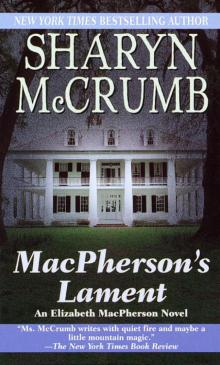 Elizabeth MacPherson 07 - MacPherson’s Lament
Elizabeth MacPherson 07 - MacPherson’s Lament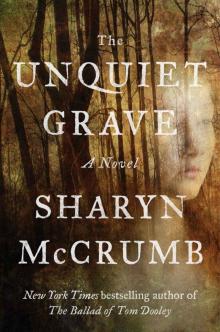 The Unquiet Grave: A Novel
The Unquiet Grave: A Novel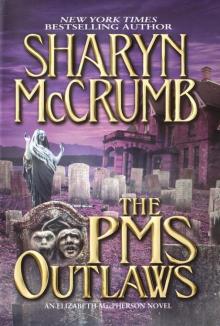 The PMS Outlaws: An Elizabeth MacPherson Novel
The PMS Outlaws: An Elizabeth MacPherson Novel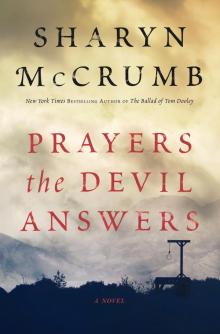 Prayers the Devil Answers
Prayers the Devil Answers Paying the Piper
Paying the Piper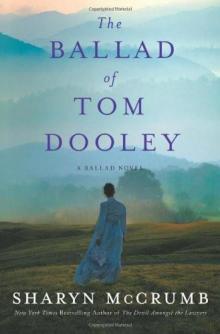 The Ballad of Tom Dooley: A Ballad Novel
The Ballad of Tom Dooley: A Ballad Novel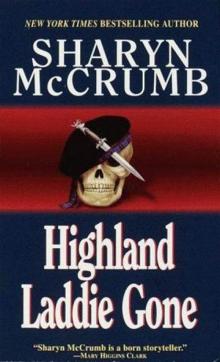 Highland Laddie Gone
Highland Laddie Gone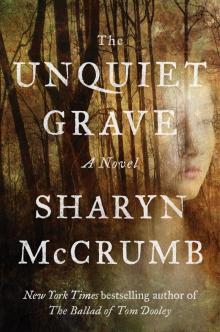 The Unquiet Grave
The Unquiet Grave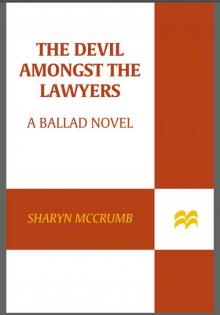 The Devil Amongst the Lawyers
The Devil Amongst the Lawyers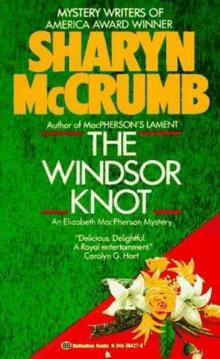 The Windsor Knot
The Windsor Knot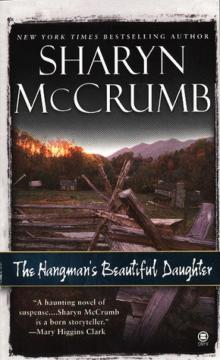 The Hangman's Beautiful Daughter
The Hangman's Beautiful Daughter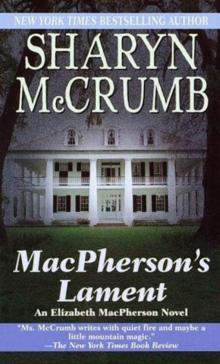 MacPherson's Lament
MacPherson's Lament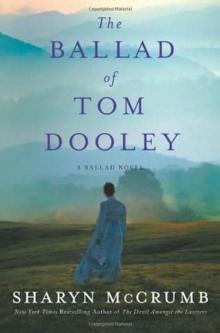 The Ballad of Tom Dooley
The Ballad of Tom Dooley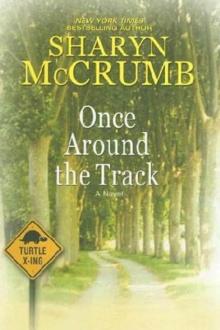 Once Around the Track
Once Around the Track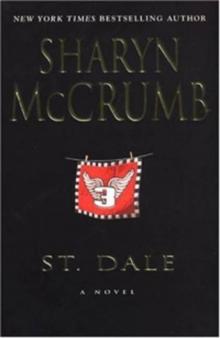 St. Dale
St. Dale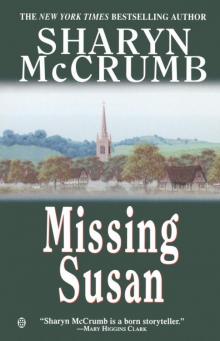 Elizabeth MacPherson 06 - Missing Susan
Elizabeth MacPherson 06 - Missing Susan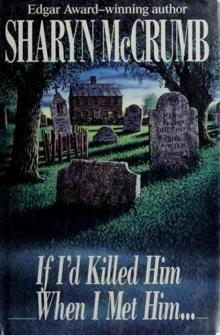 If I'd Killed Him When I Met Him…
If I'd Killed Him When I Met Him…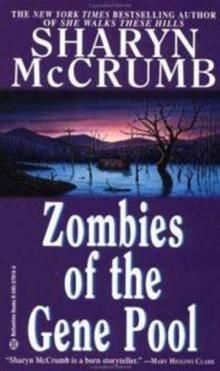 Zombies of the Gene Pool
Zombies of the Gene Pool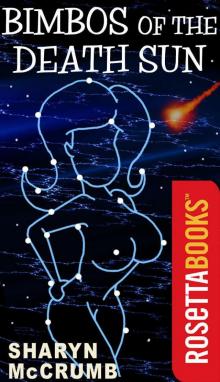 Bimbos of the Death Sun
Bimbos of the Death Sun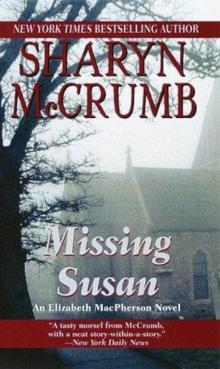 Missing Susan
Missing Susan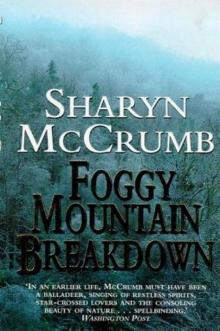 Foggy Mountain Breakdown and Other Stories
Foggy Mountain Breakdown and Other Stories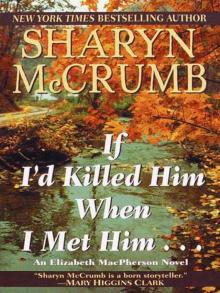 If I'd Killed Him When I Met Him
If I'd Killed Him When I Met Him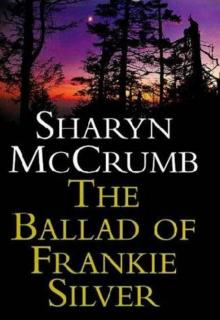 The Ballad of Frankie Silver
The Ballad of Frankie Silver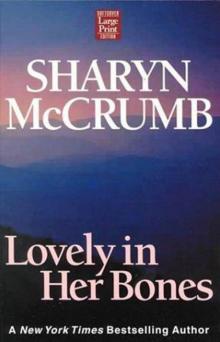 Lovely In Her Bones
Lovely In Her Bones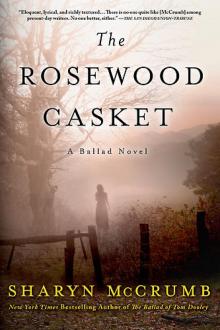 The Rosewood Casket
The Rosewood Casket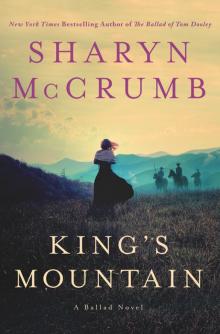 King's Mountain
King's Mountain